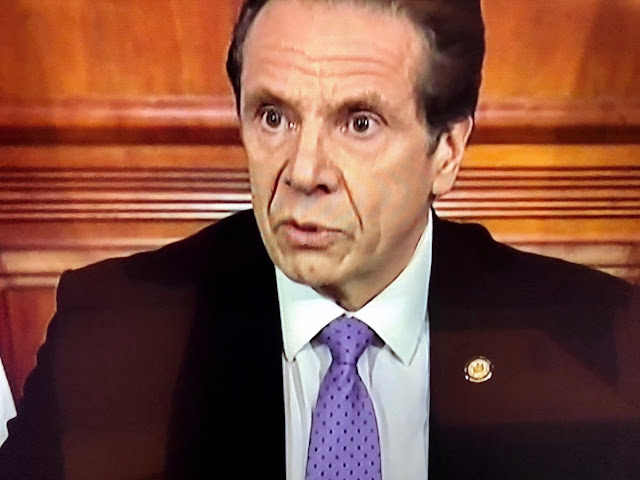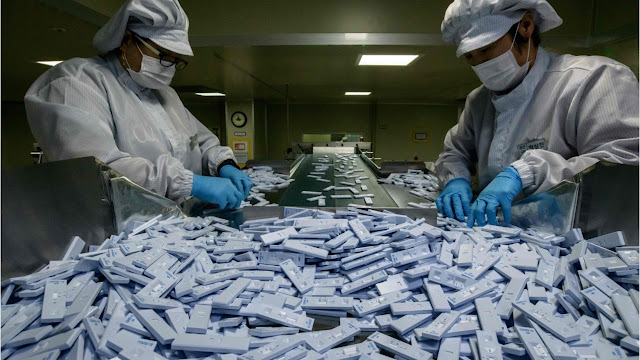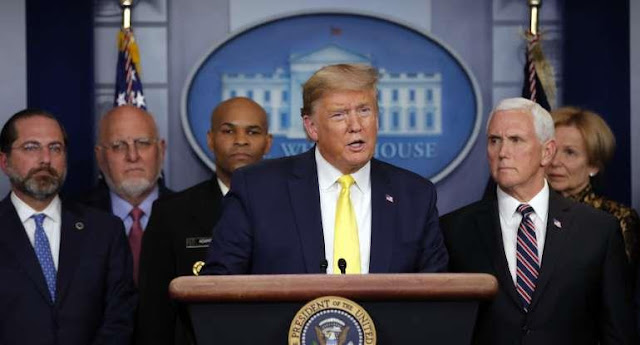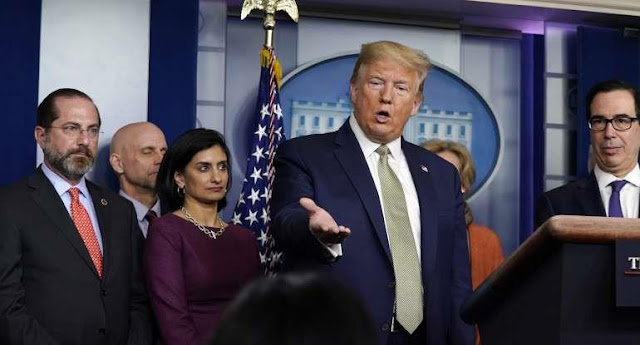BLACK REPUBLICAN BLOG |
- Cuomo Is No Hero
- Congress OKs $2T stimulus in historic coronavirus response, as rep’s objections sidelined
- Johns Hopkins Study: USA More Prepared for Pandemic Than Any Other Country
|
Posted: 28 Mar 2020 06:04 AM PDT By John Hinderaker | Powerline New York Governor Andy Cuomo, like President Trump, is delivering daily coronavirus briefings. Unlike President Trump, he is being swooned over by liberal reporters. At American Greatness, Julie Kelly collects some examples. Here is just one: “If social media is a reflection of how people are feeling, Cuomo’s image during the coronavirus outbreak is one of authority, yet hope—a role people value enough to begin visualizing his presidency,” one smitten CBS News reporter cooed. This is odd, if only because New York is the epicenter of COVID-19 infection in the U.S. The disease is more widespread there, and more problematic, than anywhere else. According to the CDC, New York has 38,977 COVID-19 cases out of the country’s 85,356, vastly more than any other state. California has 3,777, and Washington 3,207. So why would those in charge of New York’s response to the epidemic be held up as heroes, and Cuomo touted as a replacement for Joe Biden as Democratic presidential nominee? The fact that New York is the epicenter of the COVID crisis in the U.S. is no coincidence. It flows from the policies of Governor Cuomo and New York Mayor Bill DeBlasio, as well as New York City’s nature as an international hub and a closely-packed city. Back to Julie Kelly: [N]either Cuomo nor New York City Mayor Bill DeBlasio deserve attaboys. A toxic combination of Big Apple hubris, devotion to open borders regardless of the imminent threat, and Trump-hating obstinacy fueled a stubborn strategy that left their citizens vulnerable for months. Further, New York’s political leaders have acknowledged that the world’s financial capital—a city home to nearly 9 million people, the most densely populated city in the country—has no comprehensive plan to deal with a pandemic or any viral public health threat. Governor Cuomo came very late to the effort to shut down the Chinese virus: By January 31, the day President Trump suspended flights from China, “outbreaks were already growing in over 30 cities across 26 countries, most seeded by travelers from Wuhan,” according to one model by the New York Times. But even by late February, Cuomo boasted about his state’s accessibility to foreign travelers—his state, the governor said on February 26, is the “front door” for visitors from around the world—while only instituting voluntary quarantines for suspected coronavirus carriers. “Our operating paradigm has always been, prepare for the worst but hope for the best,” Cuomo said. That paradigm, apparently, did not include prohibiting hundreds of thousands of potentially infected travelers from entering his state since January. Tourists and business travelers continued to pour into the Big Apple during the first several days of March without any comprehensive screening or restrictions. Cuomo this week again bragged about his state’s open arms, which resulted in New York’s current crisis. The reason New York now has so many more cases of coronavirus, even more than California, is “because we welcome people from across the globe,” he said on March 25. “We have people coming here, we have people who came here from China, who came here from Italy, who came here from all across the globe.” Nice going, Governor! Open borders take priority over everything, including your own constituents’ lives. New York’s hospitals are overburdened and experiencing problems, but this is not a recent development: A public policy researcher in 2015 detailed long waits in New York City emergency rooms. The head of the emergency department for the Mount Sinai hospital system quit in 2018 after less than a year on the job. “I had to follow my moral compass and leave and decide this is not an organization that cares for patients,” Dr. Eric Barton told the New York Post. Last year, city nurses threatened to strike due to overcrowding at three major hospital systems. “Nurse Anthony Ciampa said he had to choose recently between feeding an elderly patient at New York Presbyterian and treating several acutely ill patients because there weren’t enough other nurses on duty,” according to a March 2019 report in the Daily News. And the outcry about ventilators? State officials were informed several years ago that the stockpile of ventilators was woefully inadequate to handle a severe pandemic. But instead of preparing for a looming crisis and buying 16,000 ventilators, the state’s health commissioner formed a task force to develop a system to ration the life-saving equipment. The task force “came up with rules that will be imposed when ventilators run short,” the New York Post reported last week. Now, of course, the same incompetent reporters who are swooning over Cuomo blame President Trump for longstanding problems in New York’s hospital system. In a sane world, the idea that the governor of the state with by far the worst coronavirus record would be singled out for praise by reporters would be unthinkable. But of course, we do not live in a sane world–not a sane media world, anyway. |
|
Congress OKs $2T stimulus in historic coronavirus response, as rep’s objections sidelined Posted: 27 Mar 2020 11:55 AM PDT The House of Representatives on Friday overwhelmingly approved a more than $2 trillion package to combat the coronavirus pandemic and send economic relief to workers and businesses squeezed by restrictions meant to stop the outbreak’s spread. The legislation, approved by voice vote despite 11th-hour drama arising from a GOP lawmaker’s objections, amounts to the costliest stimulus plan in U.S. history. It includes checks for most Americans, boosted unemployment aid, help for small business as well as a massive loan fund for corporations – at a time when unemployment is surging at a record pace, a consequence of businesses closing in compliance with social distancing guidelines. The bill, already approved by the Senate, now goes to President Trump's desk. “This bill is not only a rescue package, it is a commitment… that your government and the people whom you’ve elected to serve will do everything we can to limit the harm and hardship you face, both now and the foreseeable future,” House GOP Leader Kevin McCarthy, R-Calif., said prior to the vote. The approval, while widely anticipated, followed a stretch of uncertainty over whether one congressman -- concerned about the stunning cost of the package -- might be able to stall the vote. Rep. Thomas Massie, R-Ky., had furiously objected to a simple voice vote that would have required only a minimal number of lawmakers to travel. Massie, as part of his push, wanted to ensure there is a quorum, which would require half of the members to show up on Capitol Hill. So as President Trump and others accused him of grandstanding, hundreds of lawmakers were summoned to Washington D.C. Thursday night and Friday morning from coronavirus-ravaged communities in New York, California and elsewhere. This, despite strict guidelines from the Capitol physician advising lawmakers not to congregate at the Capitol and stay in their offices until needed to avoid the spread of the virus that has already infected several lawmakers. While Massie was able to ensure many lawmakers showed up for the vote, he was not, in the end, able to force a roll-call. The House, after several hours of debate, ultimately passed the measure by voice vote, and it was allowed to stand. There were loud cries for ‘ayes’ and few rumblings of ‘nos’ on the House floor. “The ayes have it,” declared the presiding officer Rep. Anthony Brown, D-Md. But Massie stood up and objected. “I came here to make sure our republic doesn’t die by unanimous consent in an empty chamber and I request a recorded vote,” Massie said. Brown ruled that an insufficient number of lawmakers stood in support of a roll call vote. But Massie pressed on. “I object on the basis that a quorum is not present,” Massie said, instructing a count of lawmakers. “A quorum is present and the motion is adopted,” Brown ruled, to applause. Minutes before the vote, Speaker Nancy Pelosi also took to the floor to summon lawmakers in an effort to gather quorum and shut down the Massie effort. Pelosi touted the aid forthcoming for hospitals, Americans and small businesses, while acknowledging that more needs to be done for the frontline healthcare workers and paying homage to a New York nurse who died while serving at a hospital that didn’t have enough gowns. “We know that this cannot be our final bill,” Pelosi said. In a series of speeches prior to the historic rescue bill, lawmakers pressed for unity. “We're going to help American through this," McCarthy said. "We're going to do this together and in the end, we are going to be healthier, stronger and more united than ever before because as Americans, that's who we are.” Upon catching wind of the plan to stop a roll-call vote, though, Massie howled on Twitter over the parliamentary machinations. "It’s pretty clear now, with enough members here to pass the bill, that Pelosi and McCarthy are still working together to block a recorded vote just to insulate members of Congress from ACCOUNTABILITY. Biggest spending bill in the history of mankind, and no recorded vote? #SWAMP," he tweeted. Emotions ran hot on the House floor all morning Friday before the vote on the $2 trillion stimulus bill. Rep. Alexandria Ocasio-Cortez, D-N.Y., started her impassioned floor speech by noting 13 people died in one day at Queen’s Elmhurst Hospital and medical professionals still don’t have enough ventilators and personal protection equipment. She ripped the Senate for fighting for corporate bailouts that will contribute to the income inequality gap in order for families to get “crumbs.” “What did the Senate majority fight for? One of the largest corporate bailouts with as few strings as possible in American history. Shameful!” Ocasio-Cortez said. “The greed of that fight is wrong for crumbs for our families. “There should be shame about what was fought for in this bill, and the choices that we have to make.” On the other side of the aisle, Rep. Scott Perry, R-Pa., said he’s “distressed by the Hobson’s choice” put forth before lawmakers Friday saying lawmakers shouldn’t have to accept unrelated “bailouts” to send relief. “As we discussed this and also discuss a fourth [package], no more Hobson's choice. No more billion-dollar bailouts for things that are unrelated. No more policies that are long-standing for a short-standing issue that needs are critical attention,” Perry said. “…Whatever we do, let's do no harm.” In a bizarre and seemingly unnecessary point of drama, Rep. Haley Stevens, D-Mich., refused to stop speaking when her time ran out on the House floor, even though Majority Leader Steny Hoyer, D-Md., was willing to let her finish if she had just paused to let him officially grant her more time. Instead, Stevens continued yelling and held up her hands – clad with pink surgical gloves—in an apparent homage to front line healthcare workers fighting the coronavirus pandemic even though her mic was cut. As the presiding speaker was pounding the gavel and ruling Stevens “out of order,” Stevens screamed, “do not be afraid!” Republicans, who are trying hard to flip the freshman rep’s seat in November, immediately pounced on the outburst as a “meltdown.” Michigan Democrat Rep. Haley Stevens just had ANOTHER meltdown, this time on the floor of the House of Representatives. The bill finances a response with a price tag that equals half the size of the entire $4 trillion-plus annual federal budget. The $2.2 trillion estimate is the White House's best guess of the spending it contains. The legislation would provide one-time direct payments to Americans of $1,200 per adult making up to $75,000 a year and $2,400 to a married couple making up to $150,000, with $500 payments per child. Unemployment insurance would be made far more generous, with $600 per week tacked onto regular state jobless payments through the end of July. States and local governments would receive $150 billion in supplemental funding to help them provide basic and emergency services during the crisis. The legislation also establishes a $454 billion program for guaranteed, subsidized loans to larger industries in hopes of leveraging up to $4.5 trillion in lending to distressed businesses, states, and municipalities. All would be up to the Treasury Department's discretion, though businesses controlled by Trump or immediate family members and by members of Congress would be ineligible. There was also $150 billion devoted to the health care system, including $100 billion for grants to hospitals and other health care providers buckling under the strain of COVID-19 caseloads. Frustrations were already hot as lawmakers had to return to Washington in a panic after Massie, R-Ky., threatened to upend plans for a simple voice vote and force a recorded vote. Rep. Fred Upton, R-Mich., alluded to the Massie controversy on the House floor. “So to you who oppose this bill. Please, please stand down. We can't wait another day to help. Don't add to this disruption, by in fact, being a disruptor. Be a leader," Upton said. Lawmakers spoke passionately about how COVID-19 is hurting the health of their communities and how the widespread shutdown of the economy is crippling families and businesses. Yet many openly grappled with voting in favor of bill they believe will be helpful, while it’s chock-full of other provisions that they disagree with. “This is ripping my heart out because there’s things in this bill that just don’t belong there,” said Rep. David Schweikert, R-Ariz., “I consider them”, then the GOP rep stopped himself. “Well, I can’t say that word in front of a microphone.” Schweikert, however, argued Congress must “do the right thing” by passing the legislation. However, Rep. Ken Buck, R-Colo., said he'll oppose the legislation over cost and debt concerns. "As President Trump said, we cannot let the cure be worse than the problem itself," Buck said. The Associated Press contributed to this report. |
|
Johns Hopkins Study: USA More Prepared for Pandemic Than Any Other Country Posted: 27 Mar 2020 10:34 AM PDT Despite claims by the mainstream media and the Democratic Party that the United States was "ill-prepared" to handle the coronavirus pandemic and that actions by Trump administration made us vulnerable, the United States was actually ranked the best-prepared country in the worldto handle a pandemic in a study by Nuclear Threat Initiative (NTI) and the Johns Hopkins Center for Health Security (JHCHS) published in late 2019. The United States' Global Health Security Index score was 83.5/100, the highest overall score of 195 countries. The United Kingdom came in second with a score of 77.9. Italy, which has experienced significant difficulties in handling the outbreak in their country, scored 56.2. Iran, which is also struggling to handle the pandemic, scored 37.7. The Trump administration has been the target of a significant amount of misinformation being disseminated by the Democrats and the mainstream media designed to undermine confidence in the administration's handling of the pandemic, including false reports that Trump "dissolved" the White House pandemic response office and that Trump cut funding to the CDC and NIH. Despite these false reports, Trump's approval ratings have improved in the past few weeks, and his response to the pandemic has the approval of 60 percent of Americans, according to the latest Gallup poll. The Global Health Security index "was developed with guidance from an international panel of experts from 13 countries, with research by the Economist Intelligence Unit. More than 100 researchers spent a year collecting and validating publicly available data," the Washington Post reported last year. _____ Matt Margolis is the author of Trumping Obama: How President Trump Saved Us From Barack Obama's Legacy and the bestselling book The Worst President in History: The Legacy of Barack Obama. You can follow Matt on Twitter @MattMargolis _______________ RELATED ARTICLE The Top 10 Lies About President Trump’s Response to the Coronavirus BY MATT MARGOLIS | P J MEDIA President Donald Trump speaks during a press briefing with the coronavirus task force, at the White House, Tuesday, March 17, 2020, in Washington. (AP Photo/Evan Vucci) It’s troubling to see how quickly disinformation about the government’s response to the coronavirus has spread. Democrats and the mainstream media have willingly spread false information in the hopes of damaging Trump politically before the election in November. Many of these lies were quickly debunked, but that hasn’t stopped the false information from being repeated over and over. The left hopes these lies will continue to spread, but so far it doesn’t seem to be working since Trump’s approval numbers for his handling of the pandemic have gone up. But that doesn’t mean the left will give up their disinformation campaign. To help set the record straight, I’ve compiled the top ten lies that have been spread about Trump’s response to the coronavirus pandemic. ... |
| You are subscribed to email updates from BLACK REPUBLICAN BLOG. To stop receiving these emails, you may unsubscribe now. |
Email delivery powered by Google |
| Google, 1600 Amphitheatre Parkway, Mountain View, CA 94043, United States | |



